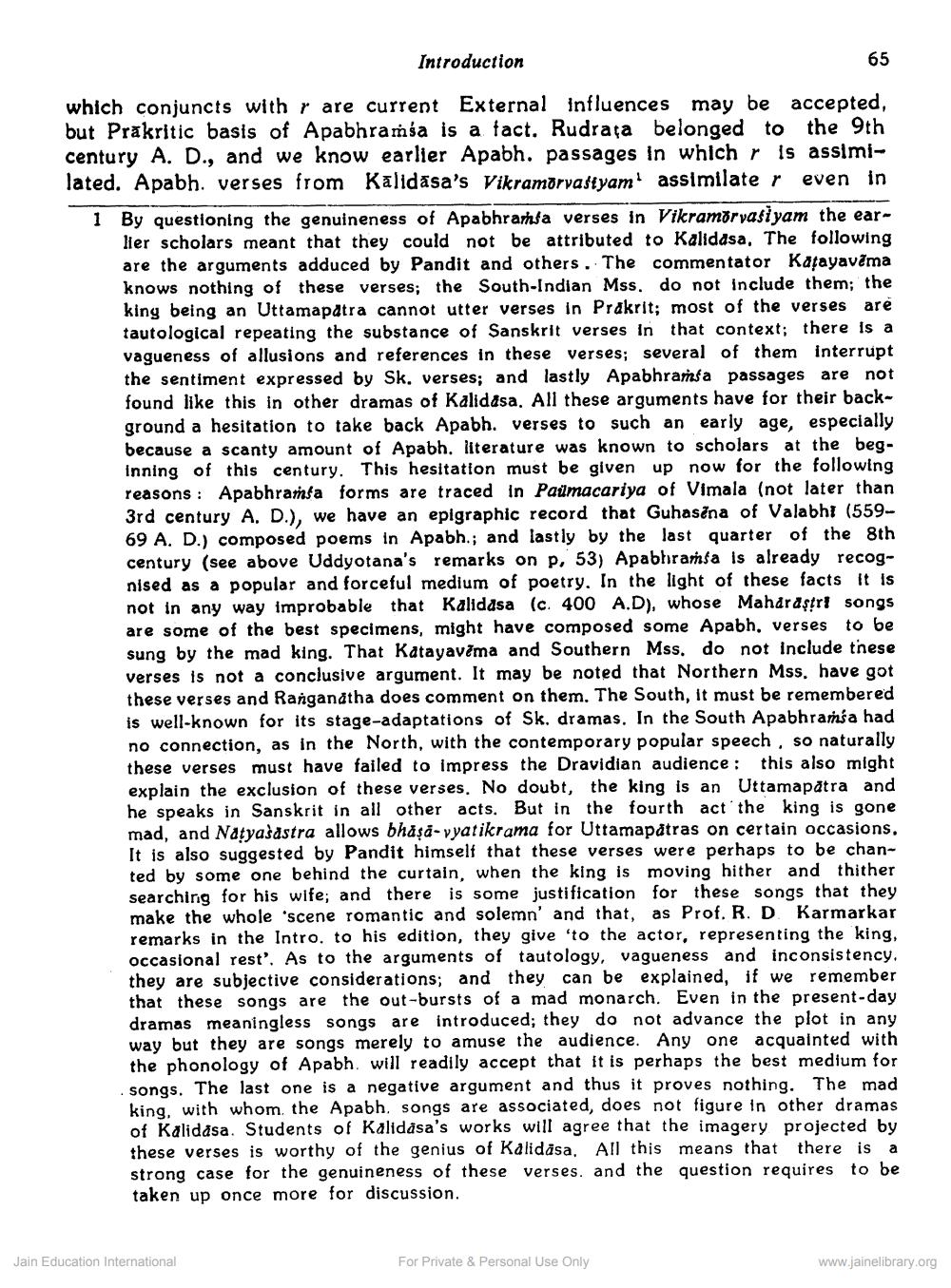________________
Introduction
65
which conjuncts with r are current External influences may be accepted, but Prakritic basis of Apabhramśa is a tact. Rudraça belonged to the 9th century A. D., and we know earlier Apabh. passages in which r is assimilated. Apabh. verses from Kalidasa's Vikramörvastyam assimilate r even in
1 By questioning the genuineness of Apabhrarhia verses in Vikramoryasiyam the ear
lier scholars meant that they could not be attributed to Kalidasa. The following are the arguments adduced by Pandit and others. The commentator Katayavčma knows nothing of these verses; the South Indian Mss. do not include them; the king being an Uttamapatra cannot utter verses in Prakrit; most of the verses are tautological repeating the substance of Sanskrit verses In that context; there is a vagueness of allusions and references in these verses; several of them interrupt the sentiment expressed by Sk. verses; and lastly Apabhramfa passages are not found like this in other dramas of Kalidasa. All these arguments have for their background a hesitation to take back Apabh. verses to such an early age, especially because a scanty amount of Apabh. literature was known to scholars at the beginning of this century. This hesitation must be given up now for the following reasons : Apabhramsa forms are traced in Padmacariya of Vimala (not later than 3rd century A. D.), we have an epigraphic record that Guhasõna of Valabhi (55969 A. D.) composed poems in Apabh; and lastly by the last quarter of the 8th century (see above Uddyotana's remarks on p. 53) Apabhransa is already recognised as a popular and forceful medium of poetry. In the light of these facts it is not in any way improbable that Kalidasa (c. 400 A.D), whose Maharaştri songs are some of the best specimens, might have composed some Apabh, verses to be sung by the mad king. That Katayavēma and Southern Mss. do not include these verses is not a conclusive argument. It may be noted that Northern Mss. have got these verses and Ranganatha does comment on them. The South, it must be remembered is well-known for its stage-adaptations of Sk, dramas. In the South Apabhraíba had no connection, as in the North, with the contemporary popular speech, so naturally these verses must have failed to impress the Dravidian audience: this also might explain the exclusion of these verses. No doubt, the king is an Uttamapatra and he speaks in Sanskrit in all other acts. But in the fourth act' the king is gone mad, and Natyašastra allows bhaşa-vyatikrama for Uttamapätras on certain occasions, It is also suggested by Pandit himself that these verses were perhaps to be chanted by some one behind the curtain, when the king is moving hither and thither searching for his wife; and there is some justification for these songs that they make the whole 'scene romantic and solemn' and that, as Prof. R. D Karmarkar remarks in the Intro. to his edition, they give to the actor, representing the king, occasional rest'. As to the arguments of tautology, vagueness and inconsistency. they are subjective considerations; and they can be explained, if we remember that these songs are the out-bursts of a mad monarch. Even in the present-day dramas meaningless songs are introduced; they do not advance the plot in any way but they are songs merely to amuse the audience. Any one acquainted with the phonology of Apabh. will readily accept that it is perhaps the best medium for songs. The last one is a negative argument and thus it proves nothing. The mad king, with whom the Apabh. songs are associated, does not figure in other dramas of Kalidasa. Students of Kalidasa's works will agree that the imagery projected by these verses is worthy of the genius of Kalidasa. All this means that there is a strong case for the genuineness of these verses, and the question requires to be taken up once more for discussion.
Jain Education International
For Private & Personal Use Only
www.jainelibrary.org




